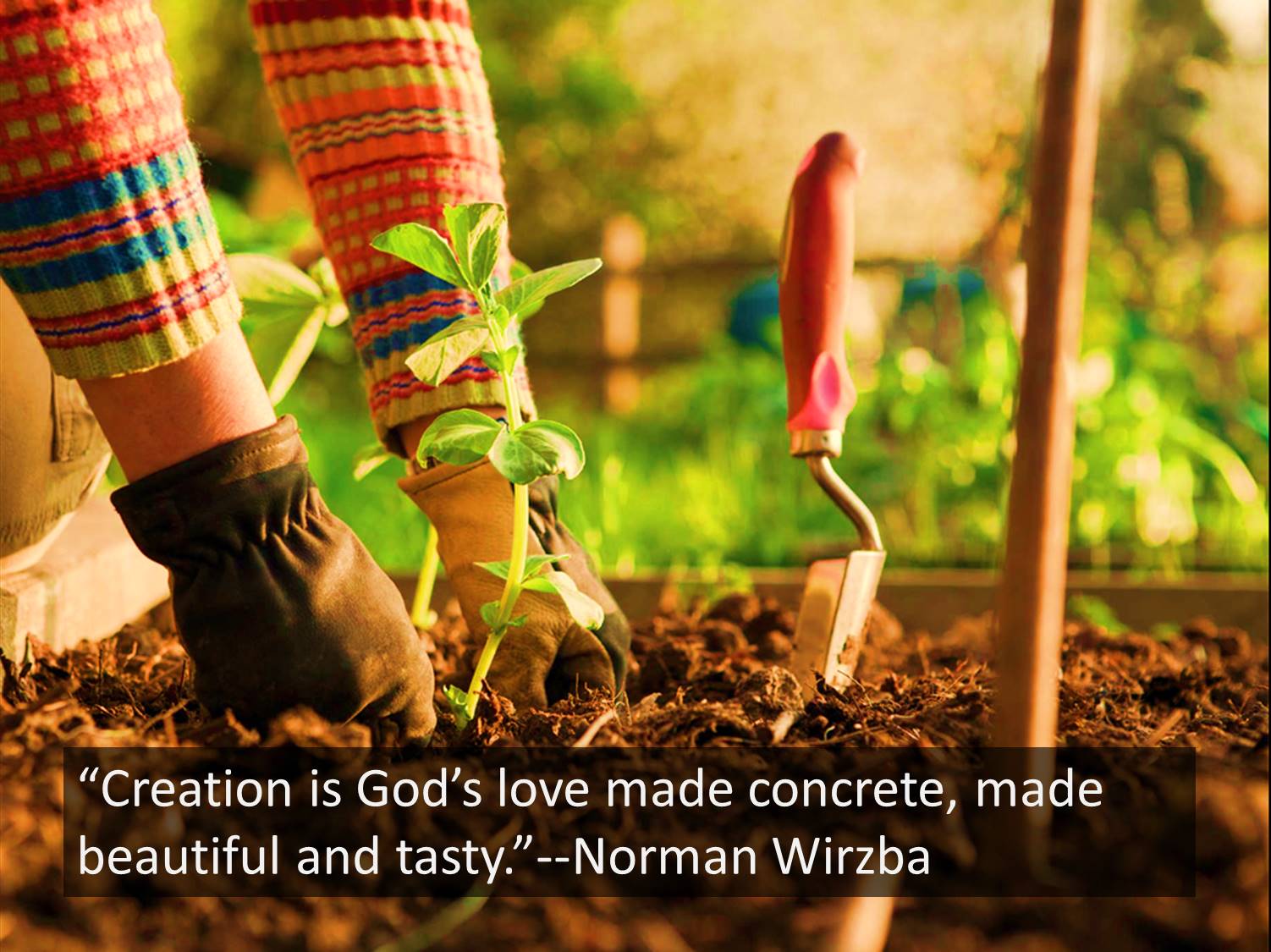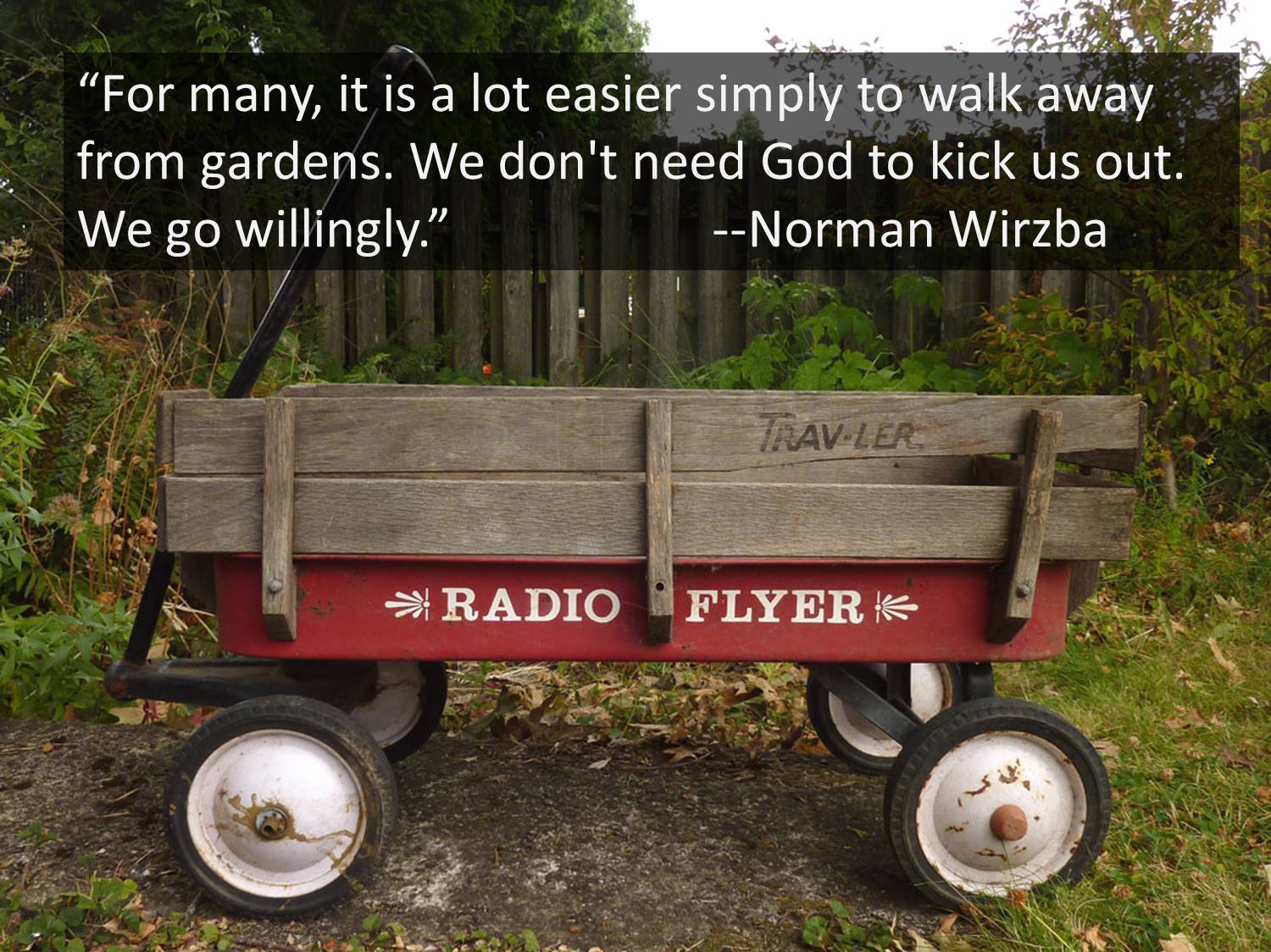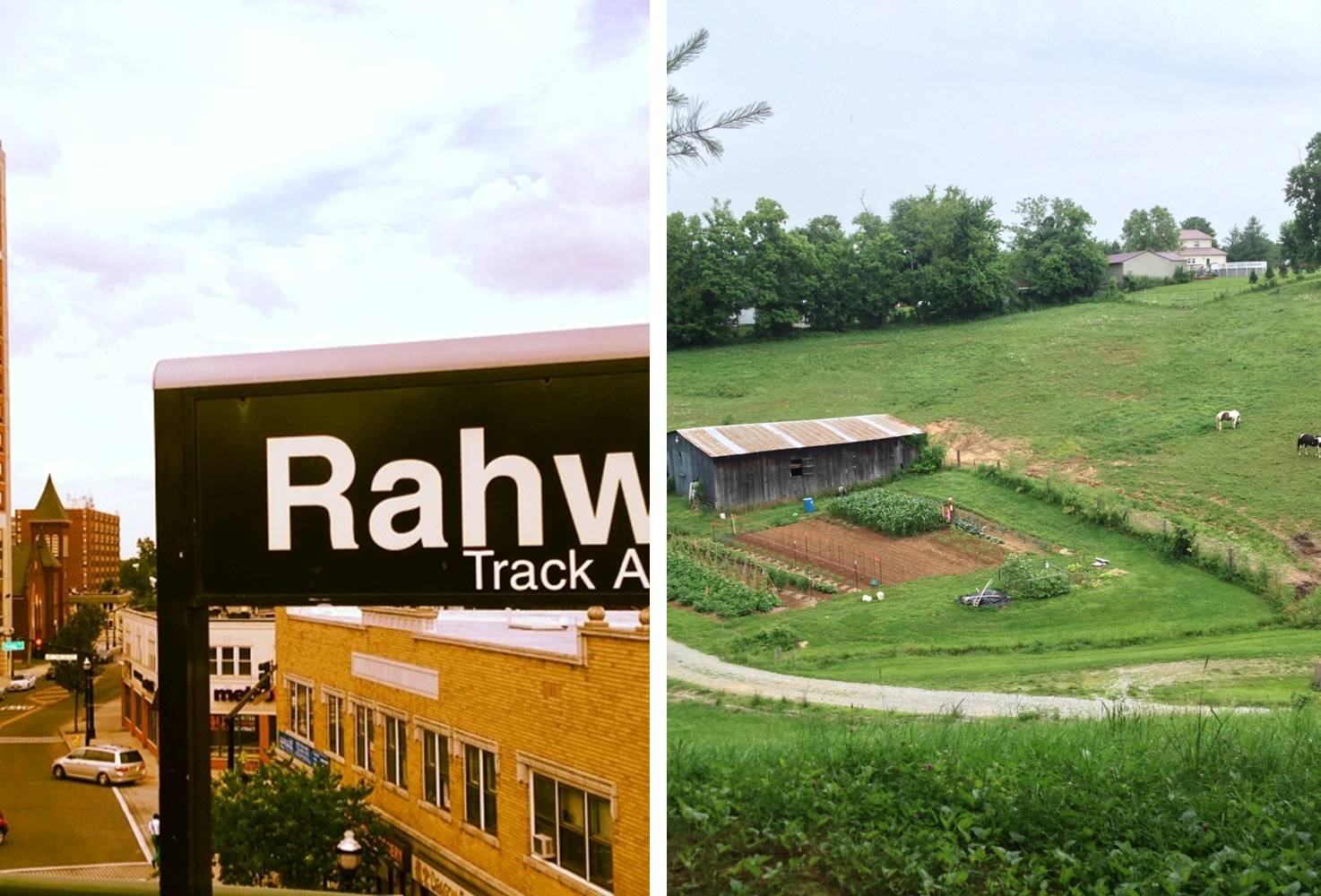Is God a goofy gardener?

That same day Jesus went out of the house and sat beside the sea. Such great crowds gathered around him that he got into a boat and sat there, while the whole crowd stood on the beach. And he told them many things in parables, saying: “Listen! A sower went out to sow. And as he sowed, some seeds fell on the path, and the birds came and ate them up. Other seeds fell on rocky ground, where they did not have much soil, and they sprang up quickly, since they had no depth of soil. But when the sun rose, they were scorched; and since they had no root, they withered away. Other seeds fell among thorns, and the thorns grew up and choked them. Other seeds fell on good soil and brought forth grain, some a hundredfold, some sixty, some thirty. Let anyone with ears listen!”
The theme of this year's Ekklesia Project gathering--which met last week in Chicago--was Creation Care. And it was amazing!! I got to listen and learn about discipleship and stewardship from Norman Wirzba, Ched Myers, some folks from Koinonia Farm, and others. Even more than that, we watched documentaries (and mockumentaries--this is a really fun group!) that several Christian communities had put together to share with us about how creation care was being lived out in their contexts.
I admit, my note-taking skills are not the best. (I have a tendency to want to tweet every good quote during any presentation that really excites me. This gives my twitter followers a pretty good indication of what I think I'm learning, but it makes my note taking quite difficult to follow. See #EPGathering2014.) But thankfully, there is a lot of material by Norman and Ched that can be found online. Here is a quote from an article by Norman on the Huffington Post website from a few years back: Gardening with God.
“Stewardship requires skill and understanding. But what it needs above all is love and affection. We will not adequately care for each other and for creation until we learn to see our care as the grateful response to God’s primordial and sustaining love and hospitality. Creation is God’s love made concrete, made beautiful and tasty. Creation is our home, the place of God’s provision, and the occasion for God’s unending delight. It will take courage to protect and cherish it.”
I love the thought that creation is God's love made concrete--though I'm not much a fan of the word concrete. I grew up in the knobs and mountains of Kentucky. So, in my current context of Rahway, New Jersey concrete is the paragon of how far I am from the garden where life began. It also reminds me to question my initial interpretations of passages in scripture that use agricultural metaphors. And since the Bible is filled with agricultural imagery, I'm doing a lot of re-reading lately.
This contrast of culture and cultivation from my own life experience was at the forefront of my thoughts this past week as I prepared my second message for Trinity UMC in Rahway. The narrative of a divine sower casting seeds across creation took me back to my family's first days on our farm in Kentucky. Our task was to turn our new home into a habitat for all kinds of life.
When I think about our farm, I often remember days of freedom. My brother and sister and I ran wild all over these stoney hills. And it quickly became our imaginary kingdom. I had one of those little radio-flyers I took everywhere with me. I loved that wagon. But looking back, I can see the trick my parents played on us. Parents give children these little red wagons and call them toys, but before long, the expectation is that they will become tools. That wagon was both my treasured toy and my favorite farming tool.
Our small little farm in Bradfordsville, Kentucky was called Stone Hill, and one of our first tasks was to walk around the farm and pick up rocks. You can't grow a garden until you first get rid of the rocks. I drug that wagon all around our farm, filling it with rocks and stones and tough clumps of dirt. When I complained of being tired of making Stone Hill a little less stoney, I was directed to take my wagon into the garden and pull up weeds. Occasionally, I would get scolded for filling my wagon with a mixture of weeds, green bean vines, and green onions.
I often miss that season of my life. I miss the clean air and the dirt on my hands. But at the time, I hated it! I swore to my parents that I would one day leave that place and never go back. I declared that I was going to move to the city, get rich, and hire workers to do the yard works so that I never had to do it again. Like Norman Wirzba says, "For many, it is a lot easier simply to walk away from gardens. We don't need God to kick us out. We go willingly."

Rereading the text for this week while thinking back to those early days on Stone Hill made me think, if God is the sower of the seed, then why doesn't God know how to garden? Nobody who knows anything about gardening would be that wasteful with their seeds. Surely God knows better. Right? Perhaps God doesn't have a radio flyer.
It is as if God is like that kid in high school who wanted to see what happens when you put an unopened can of baked beans on the fire. The beans get hot and expand. And then...the can explodes. This mixture of ash, beans, and boiling barbeque sauce go everywhere and all over everyone. It's an interesting way to cook beans, but it doesn't make for much of a side dish. Maybe God just wanted to see what happens? How could God have been so careless?
This must be important stuff! Jesus doesn't always explain his parables, but this time he did. When explaining it to his disciples, he told them, "To you it has been given to know the secrets of the kingdom of heaven" (Matthew 13:11).
This is where that agricultural rereading comes in. I've always heard this passage interpreted through the hermeneutic of shame. Most people have hard hearts, too many cares, or not enough sincerity, and this explains why they cannot accept the gospel. "If you ask too many questions, you should be ashamed of yourself. Don't you know you can't get saved that way? If you worry too much, you should be ashamed of yourself. Don't you know that God doesn't care about what you care about? Why can't you be more sincere? You should be ashamed of yourself. Why can't you be like me? Let my saintly life be an example of what it looks like when God's seed is received by good soil!"
This can't be the gospel! This doesn't sound like good news! When read through the hermeneutics of shame, passages like this are no longer the gospel of Jesus Christ, but the gospel of abusive Christian triumphalism and self-idolatry.
Rather than reading the text to tell us how to judge our neighbors, I read the text to teach me about the character of God. Instead of a hermeneutic of shame, I choose to read with a hermeneutic of love. Like that exploding can of beans, I think this text tells us that God is careless--carelessly in love with Creation. The point of this passage is not just to illustrate what is the matter with our hearts, but to illustrate what is the manner of God's love.
God's love is indiscriminate!!!
As Jesus tells us earlier on in the gospel of Matthew,
“You have heard that it was said, ‘You shall love your neighbor and hate your enemy.’ But I say to you, Love your enemies and pray for those who persecute you, so that you may be children of your Father in heaven; for he makes his sun rise on the evil and on the good, and sends rain on the righteous and on the unrighteous. For if you love those who love you, what reward do you have? Do not even the tax collectors do the same? And if you greet only your brothers and sisters, what more are you doing than others? Do not even the Gentiles do the same? Be perfect, therefore, as your heavenly Father is perfect." (Matthew 5:43-48)
God never chooses who or where to pour out love. God loves both God's enemies and God's friends equally. As Romans 5:8 reminds us, "While we were yet sinners..." In other words, if enemy love was not at the heart of the Good News, there would be no hope for anyone, ever! Salvation is only attainable for us because God does not choose who and what to love. Unlike the gardener who strategically determines the best plot of land on which to plant a garden, God loves indiscriminately. God's garden is not like our gardens. The Kingdom of Heaven is not like our kingdoms. God doesn't play by our rules. Like an exploding can of beans or a goofy gardener, God's love is not strategic, it is prodigal!
That should challenge us. Do we love indiscriminately?
Once we read this passage as a testimony to the indiscriminate love of God, we can begin to see how important it is that we learn to care for the creation around us that God so deeply loves. Like God, we are called to be gardeners.
Many people think that being a Christian is primarily about what a person believes. But it is not just enough to believe in Jesus, we have to believe in who and what Jesus believed in. As Norman Wirzba challenges us to see, to be converted to Jesus is to be converted to the world around us, to creation, to our neighbors--our friends, yes, but especially our enemies.
And that means, perhaps, that we should think of our days as children with radio-flyers. Our calling as followers of Jesus is to learn to love well. This means we have a special task with those around us who have hearts of stone--we love them. And we can trust that a day will come when enough of that stone has been removed so that God's love can begin to germinate in their lives. This means that we have a special calling to those whose lives are tangled with troubles--we love them. And we can trust that God will teach us to help share their burdens, making their lives a bit more manageable so that God's love can find a home. This means that our dedication for God even leads us to be dedicated to those whose faith is, at times, insincere. With them as with everyone else, we must learn that even the most insincere are sincerely loved by God.
Stewardship, creation care, requires love and understanding. The world around us is God's love made concrete, made visible. And God's love is indiscriminate, ever at work, behind the scenes, doing things we may never have the capacity to comprehend.
Along with my friends from the Ekklesia Project, I pray that our Christian communities can become the catalysts that enable life to flourish all around us. That we learn to fashion our swords into ploughshares. That we learn to grow more gardens rather than pour more concrete. But at the heart of it all, I pray that we learn to be communities that imitate God by learning to love deeply, to love patiently, to love well, to love indiscriminately.
The Ekklesia Project (EP) gathering is held annually at DePaul University in Chicago. The Ekklesia Project is a network of Christians from a variety of traditions (Catholics, Methodists, Episcopalians, Anabaptists, house churches, etc.) who "rejoice in a peculiar kind of friendship rooted in our common love of God and the Church." Please visit the EP website for more information, great resources, or to become an endorser.

